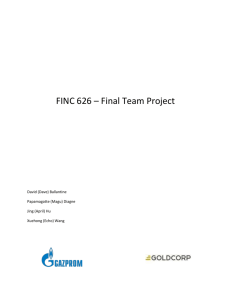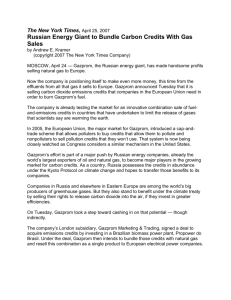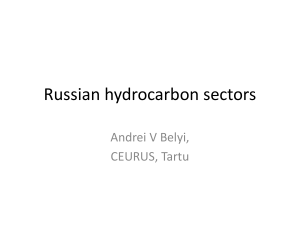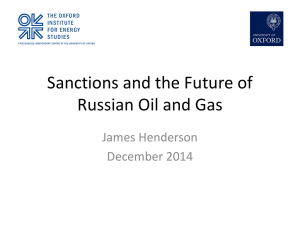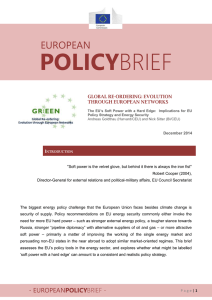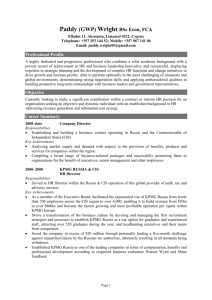Main Drivers of Russian Gas Policy
advertisement
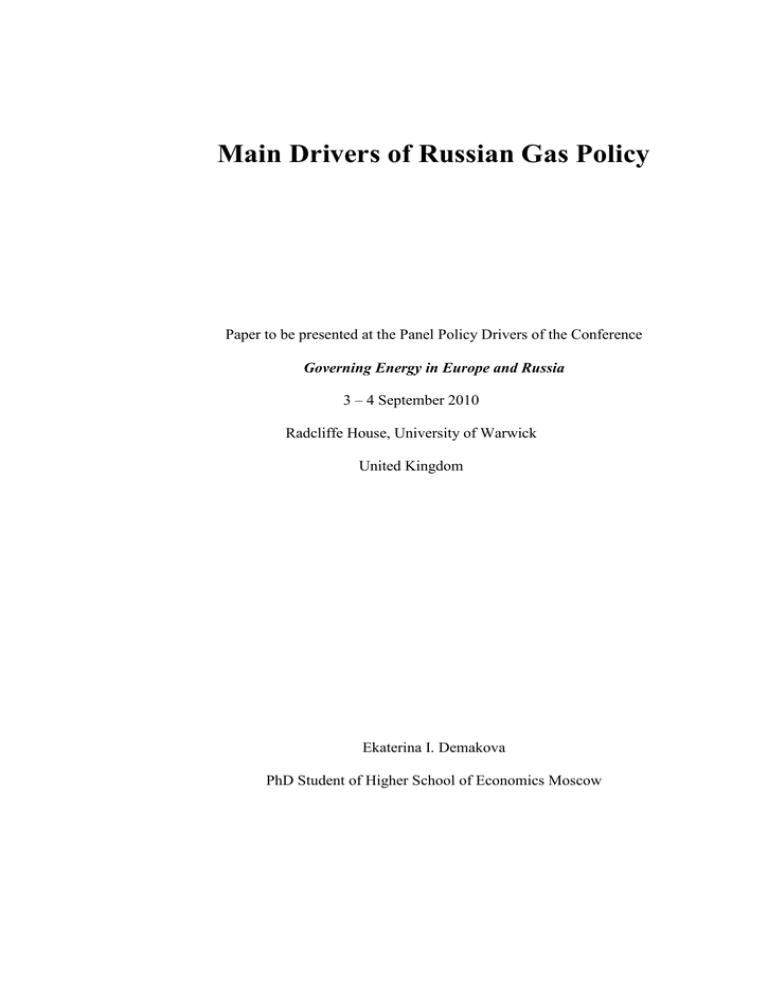
Main Drivers of Russian Gas Policy Paper to be presented at the Panel Policy Drivers of the Conference Governing Energy in Europe and Russia 3 – 4 September 2010 Radcliffe House, University of Warwick United Kingdom Ekaterina I. Demakova PhD Student of Higher School of Economics Moscow Introduction This paper is a work in progress and forms a part of a wider thesis on Russian gas policy. The relevance of studying Russian gas policy can be explained by the huge reserves of gas in the country. Russia processes 664 Bcm of gas. Most of the proven reserves belong to Gazprom. In 2009 Gazprom exported 152, 81 Bcm of gas, most of which goes to European countries. Therefore Gazprom provides an important share of export revenue in Russian state budget. Much of analysis has attempted to define main drivers and actors in Russian gas policy. In particular, a debate has emerged about a level of political involvement in the decision making in Russian gas policy strategy of the main gas supplier to Europe - Gazprom. In other words, can we define Gazprom as Russia? Or Russia as Gazprom? The literature on this topic could be divided into following parts: - - - Inside from the politicized perspective – there is literature were much of the analyse or thesis are grouped around the concept of friend – enemy. Russian – European relations are viewed from the perspective of thread in connection to security of supply and demand. The main source of it overviews are presented by politician, political supported centres. (Yasev) Economic analysis of the development of gas industry in Russian and Europe. Authors are concerned around the analysis of the present and future indicates of the gas sector development and the development of Russian and European energy market. (J.Stern, CERA) Political analysis of Gazprom as an actor in Russian policy and policy making in Russian gas sector (Tkatschenko). All of the above mentioned divisions present and interpret the relations between the Russian state and Gazprom in different ways, but none doubts that this relation exist. In this respect, it could be useful to analyze Russian drivers from an institutional perspective. In particular, interests would be useful to apply the ‘agent-principle’ perspective. This theory addresses two issues: - When the goals of principal and agent are different And when a principal and an agent have different attitude towards the risk (risk sharing problem)2. Discrepancies in goals are determined by the different attitude to the problem to be solved. The risk sharing problem by the action taken and its consequents is the more complex issue. The principal hires an agent to resolve the special case under conditions which are preferable for the principal in the current moment. The agent could have the different interests and attitude to the case. So the attitude towards the same risk is different. The unit of analysis of the agent theory is relationships between the principal and the agent. The theory focuses: 1 Gazprom annual report 2009. http://www.gazprom.ru/f/posts/28/135151/annual-report-2009.pdf Eisenhardt, Kathleen M. Agency theory an assessment and review // Academy of management review, Jan 1989, Vol. 4, No. 1, P. 58 2 - on the balance of assumptions about people (personal characteristics of key actors to the particular case), organizations (if any institutions influence on this relations and on which way), And information (accuracy and completeness of information sharing between the principal and the agent). Practically, agency theory articulates around a contractual interrelation as well as information flows between an agent and a principal. In short, Gazprom and the Russian state are interlinked by mutual obligations and information-interest based behaviour of both agents. It should not be forgotten that Gazprom is purely commercial actor, which mainly targets financial benefits, although it is sometimes used for other political purposes. In turn, Russian state represents interests of various agents, which might include Russian foreign policy making, oil industry lobbying, foreign investors lobbying and not only Gazprom. We will try to understand who is an agent and who the principle in this interrelation is. In order to clarify this complex and very in transparent interrelation, the study will contain 4 parts. At first, we will overview policy at upstream level, where Gazprom is strongly favoured compare to other companies. At second, we will outline recent developments in domestic gas markets, where vivid debate exists about the access to network and subsequently domestic markets. At third, we will overview Russia’s and Gazprom’s views on transit conflicts with Belarus and Ukraine. Last but not least, we will touch upon a securitization of energy (and particularly gas policy) regarding the European liberalization (so-called security of demand). 1. Upstream Gazprom monopolizes domestic markets in Russia. A monopoly also exists for gas exports, which also covers LNG and condensate. In this respect, Gazprom hinders the development of independent gas producers (mainly oil companies) as well as of foreign investments. In this respect it will be useful to analyze the situation with access to the new fields and the access to the export market. 1. 1 Investments in new Gas resources Much of the current commercialized gas fields with immediate commercial significance are owned by Gazprom. New fields have little likelihood of commercialising because of the variety of reasons – location of the field, complex geology, and high investment requirement. The independent from Gazprom companies may not have enough financial instruments to reach this aim. Strategic sector law adopted in 2008 classify the exploration of subsurface resources and/or research and development work on the sites of subsurface resources of the federal importance3. Also includes the gas transportation system to the strategic sector4. In relations to the gas sector it means that there are no foreign investments allowed for the exploration and R&D works on new gas fields and in the gas transmission system. The law has no retrospective action. The law stipulates the detailed procedure of foreign investments negotiation in the sector. This means that it is under the state protection and with no formal interests. The Russian state protected the primer gas sector from the influence of the foreigners if those activities do not 3 4 Article 6, point 38, law adopted as at 29 April 2008 № 57-ФЗ «Strategic sector law» Article 6, point 36, law adopted as at 29 April 2008 № 57-ФЗ «Strategic sector law» coincide with state interests. The other side of this law is that foreign investments in the sector are restricted. There are only few state-owned companies which are interested in development of gas fields. In practice: Gazprom and Rosneft. It is common knowledge that “the development of energy resources into a useful energy service is a risky business requiring high investment along the chain from resource development to the final customer. It requires not only high investment but often investment specific to the site or to a special link in the chain”5. The gas transmission system (GTS) is also included in the strategic sector. The beginning of the building is 1940th year. The length of GTS which is owned by Gazprom is 164 thousand km. It builds 51, 6% from the total assets of Gazprom as at 31.12.20096. It is fully owned by Gazprom, who does not intend to allow the foreigners to gas transmission, as it does not want to lose the control over the main asset of its balance. But the condition of the pipes is not well. The diagram below represents the usage by years of the pipes: Source: Gazprom annual report for 2009 As it can be seen from the diagram above the infrastructure requires investment. The low end user prices caused the lack of profitability in the transmission sector7. The control over the supply gives Gazprom curtain income. As it can be seen from the examples above the strategic sector law was adopted in favour of Gazprom. The main purpose of the company is revenue maximisation. The Russian state was an agent in solving this task. It is about the short term perspective. In relation to the middle and long term aspects the monopoly is not in the economic interests. And the perspective of state controlled market could bring to the lack of investment and as a result to the decline in gas production and transportation. In this case the conclusion could be drawn that the roles sharing is the following: Gazprom is a principal and the Russian state is an agent. Also the high securitization of sovereignty over the 5 Putting a Price on Energy: International Pricing Mechanisms for Oil and Gas http://www.encharter.org/index.php?id=218&L=0 6 Gazprom annual report for 2009 http://www.gazprom.ru/f/posts/28/135151/annual-report-2009.pdf 7 Future of Russian gas and Gazprom by J. Stern, p 37 (2007) resources contributed to that strategic law. Gazprom acquired new capacity which is relevant for the company in light of declining of the main commercialized fields. 1. 2. Gas export bill Gas Export Bill (adopted in 2006) makes Gazrom the legal single gas exporter. It practically reduces an interest in exploring gas resources because a company knows that it will supply it only to the domestic market. Revenue on it is much lower than on export sales. Export Bill was lobbied by V. Yazev, the Chair man of Russian Gas Society. RGS is a nonprofits partnership of oil and gas industry companies (established in May 2001). Key Russian gas producers, gas-transport companies, regional gas-distribution and sales organizations, research institutes, metallurgical, construction, and chemical companies are among the members of the Russian Gas Society (RGS). The RGS members produce more than 97% of Russian gas 8. In practice it represents interests of Gazprom. One of the framework activities of RGS is effective co-operation of the gas market participants with legislative and executive authorities. The chairman of RGS at the date of accepting the Export Bill was the chairman of the energy committee in State Duma. The vice president of RGS is O. Zhilin, was the first deputy director in Mezhregiongaz (Gazprom’s subsidiary). Therefore RGS is a strong Gazprom lobby representative in Russian parliament. In 2006 (the year of adoption of Export Bill) V. Yazev said: “control over the gas export eliminates the competition of Russian gas export companies abroad. The consequence of the competition is reduced prices on exported gas. The control over the gas export will protect the commercial interests of the supplier and the state”9. The example of “bad” competition between the Russian energy suppliers to the foreign market were negotiations about the gas and electricity supply to the Chinese market. The two monopolies had no agreed pricing policy. The situation was in favour of China as it had the opportunity to minimize the price. But for the suppliers the project became commercial unfavourable. For the gas sector the bill eliminates such possibility in relations to gas from Kovykta (owned by TNK-BP) and Sakhalin gas (owned by Gazprom). The gas export Bill stipulates also the monopoly on export of LNG except the PSA projects signed before 2006. Here, Gazprom (through RGO) played a role of principle. Whereas the State reacted to the demand of RGO and therefore the Bill was adopted very quickly. In fact that the access to the big gas fields is limited Gazprom adopts the new strategy of domestic market opening through the stock exchange for oil companies and other independent gas producers. This is made for attractiveness of the investments in the small and medium gas fields. The stock exchange is concerned with domestic market only. 2. Domestic market Gazprom monopolizes the domestic market through controlling the pipeline10. 8 The Russian Gas Society official website // http://en.gazo.ru/about/ Gas for Europe – Gazprom is going to be an exclusive saler of Russian gas abroad // "Rossiiskaya gaseta”- Feredal addition №4114, 11 July 2006 г. 10 Future of Russian gas and Gazprom by J. Stern, p 20 9 Currently it is economically unbeneficial for Gazprom to have state control gas prices in domestic market. It caused Gazprom loss in the domestic gas sales, which should be compensated by the export sales. The economic crises of 2008 influenced on the reduction of volumes of gas sold to export by 18%. For Gasprom the liberalization of the domestic gas prices is preferable. Also oil companies (mainly Rosneft) press over internal market opening. They need access to pipelines and export. According to the statistic near 14, 9 mlrd m3 of associated gas is fired every year11. This volume could be transferred to money by oil companies. Board of Directors of Gazprom approves the strategy of gas pricing based on special gas price formula beginning from 1 January 201112. This formula is market oriented and is based on equal level of yield from the domestic and export gas sales taking into account the interfuel competition. This pricing formula will be adopted only for industry customers while the private sector price will be state regulated. The use of this pricing formula will increase the revenue of Gazprom from domestic market sales starting from 2014. Also it will allow the independent gas producer (for example oil companies) to participate in the domestic gas trade through the electronic brokers’ board Mezhregiongas13. Currently following companies participate on Mezhregiongas as the seller: OAO Novatek, ZAO Transnafta, OAO NK Rosneft, OOO NG Itera, OOO Novourngoyskaya Gasovaya Company14. OAO NOVATEK (hereinafter referred to as “NOVATEK”) and its subsidiaries (hereinafter jointly referred to as the “Group”) is an independent oil and gas company engaged in the acquisition, exploration, development, production and processing of hydrocarbons with its core operations of oil and gas properties located and incorporated in the Yamal-Nenets Autonomous Region (“YNAO”) of the Russian Federation. The Group sells its natural gas on the Russian domestic market at both regulated and unregulated market prices; however, the majority of natural gas sold on the domestic market is sold at prices regulated by the Federal Tariff Service, a governmental agency. The Group’s stable gas condensate and crude oil sales are sold on both the Russian domestic and international markets, and are subject to fluctuations in benchmark crude oil prices. 15 . ZAO Transnafta the main activity is transmission of gas, exploration of LNG in Volgograd region, gas trade16. OAO NK Rosneft main activities are exploration, development and sale of oil and gas to Russian and export market17. OOO NG Itera exploration and gas trade internationally18. OOO Novourngoyskaya Gasovaya Company is oil and gas trading company. No clear information provided. Russian state might foresee a restructuring of Gazprom. But according to many analysts (Mitrova.) Russia will not move to a UK-model of unbundling. Instead, Gazprom might accept to give access to independent producers in several segments, for example sales of LNG as it was the issue with Novatek. Despite of the gas export bill Novatek obtained the right to sell LNG from his field to the export market. It was possible after the negotiations with Gazprom and signing up the contract for export of LNG. Also it was possible, as some analysts said, as the result of acquiring significant amount of shares by G. Timtchenko, the former politician who has the good relations to the political crises of Russia. 11 http://institutiones.com/industry/1364-rynok-prirodnogo-gaza.html Gazprom official website // http://gazprom.ru/press/news/2010/april/article97630/ 13 Mezhregiongaz official website // http://www.mrg.ru/etp_about 14 Mezhregiongaz official website // http://www.mrg.ru/etp_contragents_list 15 Novatek IFRS consolidated Interim Financial information (unaudited) as of and for the three and six months ended 30 June 2010 // http://www.novatek.ru/netcat_files/449/420/h_a6b1843d782b1ca5a1331d2c6619b554 16 Transnafta official website // http://www.trans-nafta.com/about.html 17 NK Rosneft IFRS consolidated Interim Financial information (unaudited) as of and for the three and six months ended 30 June 2010 // http://www.rosneft.ru/attach/0/57/73/Rosneft_GAAP_6m_2010_RUS.pdf 18 Itera official website // http://www.iteragroup.com/isp/go//50/50/ 12 In this case of transmission of gas it is clear that Gazprom is pressed by the State to adapt to the markets. The company had to give an access to the independent companies to the transmission system. But Gazprom is still a principle, because it is in the long term interest of the commercial company to liberalize gas pricing to get the higher margin. But the State is able to press Gazprom as it is in case of access the independent gas companies to the brokers’ market for gas trade. The situation of the opening the domestic market does not involve the export of gas. The strategy of Gazprom in the export market differs from those on domestic. 3. Transit of gas When we analyse the transit of gas it is clear from the beginning that in most of the cases Russian state acts as a principle and Gazprom accepts a role of an instrument. To the forefront come the geopolitical interests of the state. The state and the company have different goals in the case of gas transit. The company has a commercial background on this matter. For the existed transportation routes the company takes into account the transit tariff, reliability of transit pipes. The state used the transit of gas to the countries as one of the instrument in the foreign policy. Therefore the attitude to the risk also differs. The lost of the transportation routes for the company caused the lost in money and breach of the contractual obligation. The company wants to get the control over the transportation channels to prevent such situations. The state on the one hand could influence on the transit countries through the gas supply to them or to the enduser. One the other hand manipulations with the existed transit routes or development of the new ones gives the state the one more instrument to its foreign policy making strategy. By the analysis of this situation it is important to analyse the interrelations between the principal and agent. We should take into account the balance of assumption about people responsible for decision making. In case of Russian state and Gazprom it is obliviously that there are the same people in government of the company and in the state decision making institutions. The contract is concluded only between two actors (Gazprom and the state). The influence of the third party on these interrelations is indirect. So, the state as a multiple actor is influenced by the other actors (for example, Rosneft the oil company which is interesting in sale of associated gas and access to the gas pipelines). The accuracy and completeness of the information flows between the state and the company is guaranteed by the fact that the same people are in Gazprom and the state. In the Russian foreign policy concept the government stipulates the high importance of developing of the interrelations between the CIS countries and intergovernmental organizations including the Custom union between Russia, Belarus and Kazakhstan19. Negotiations about the Custom union came to the stop in June 2010 after the long dialog between Russia, Belarus and Kazakhstan due to unwilling of Belarus to sign the agreement. The case is that Belarus does not want to open the border as the state budget will lose the custom dues for transportation of Russian oil. Parallel to that event Beltransgas and Moldovagas have the break of contractual obligations to Gazprom for importing of Russian gas20. The Russian state acting as a principal using this 19 Russian foreign policy concept published at http://www.kremlin.ru/acts/785 situation to hire Gazprom as an agent in this situation to reach its aim. It is interesting that the principal does not give the agent the same right to act with Moldovagas. Belarus owned 192 mln USD21 which is less that 1% from the revenue from sales to the CIS market. Gazprom was told by the state to fulfil the contractual obligation in full which means that it should stop the gas supply to Belarus proportionally to the amount of indebtedness. After the stop in gas supply two agreements were signed – amicable agreement between Gazprom and Beltransgas for paying debt back and the Custom union agreement between the Russia, Belarus and Kazakhstan. In this situation it is clear that the principal and the agent had different goals. Principal want to press Belarus to sign the custom union agreement which is the national security matter. The goal was rich. The Custom union will strengthen the Russian position in CIS. Agent had the goal to press on the debtor. The amount involved is not so high in comparison to the total revenue. The case with other debtor – Moldovagas – was left unsolved. The other case of transit of gas was with Ukraine. This section is under development, because it takes the time period from the beginning of the 1990th to the early 2000. There were different structures in Gazprom and in the state. There were several cases of stop in gas supply during the time period and all of them from the political perspective were around the Black see fleet. Russia has different political and commercial value towards Belarus and Ukraine. These countries are dependent on Russia and have not the big share in market. In the same time relations with Europe differs. The situations which are possible towards Belarus and Ukraine are unlikely regarding Europe as it is the biggest and more preferable market. 4. Securitization towards UK - EU-model Russia is the biggest gas supplier to the EU. In 2006 Russia exported to EU 4 927 552 TJ (terajoules), which made up 42% from the total import.22 The total amount of imported gas for EU-27 as for the year 2006 is 60, 8%.23 21, 1% from the total consumed gas is spent on electricity generation24. The dependence is obviously. EU-Russia relations have entered into a spiral of misunderstandings and of an unprecedented ‘securitisation’ of energy related affairs. Parties to the topic are disabled to find the platform for the compromise decision, particularly in energy matters. It needs a political accord. “The concept of energy security has gained a much broader meaning than that of simple energy dependency and supply shortages. The concept of energy security stems from general perceptions of threats coming from ‘outside’”25. 20 Gazprom IFRS consolidated Financial report for the year ended 31 December 2009 // http://www.gazprom.ru/f/posts/28/135151/ifrs_rus_12m2009.pdf стр 56 21 Belorus debt // Kommersant № 105 (4405) dated 16.06.2010 22 EU energy and transport in figures, P 29, http://ec.europa.eu/energy/publications/statistics/doc/2009_energy_transport_figures.pdf 23 EU energy and transport in figures, P 30, http://ec.europa.eu/energy/publications/statistics/doc/2009_energy_transport_figures.pdf 24 EU energy and transport in figures, P 45, http://ec.europa.eu/energy/publications/statistics/doc/2009_energy_transport_figures.pdf 25 Why a Political Accord is Needed to Make EU-Russia Energy Relations Work (WP) A.V.Belyi // Area: Programme Energy / International Economy & Trade Working Paper 19/2009 17/4/2009 // Elcano Royal Institute Madrid – Spain www.realinstitutoelcano.org Technical issues between Gazprom and European companies became a political agenda at the top level. It is actually the securitisation process. EU seeks to have the liberalised Russian gas market as in this case there will be the transparent and clear structure of the main supplier. Russia and Gazprom rebuffed any possibility of the EU model export to Russia. Both are in favour of the strict state control upon the sector. At the same time, non-liberalization (weak restructuring) of the sector may represent a potential limit to participate in the European downstream. During a summit with the then German Chancellor Gerhard Schroeder in October 2003, Putin expressed Russia’s new approach in this area very directly by saying that ‘we are not going to divide Gazprom. The EU Commission should not have any illusions: in the case of gas, it has to deal with the state (i.e. Russian Federation). The gas pipeline network is the creation of the Soviet Union, and it is only the Russian Federation which can keep it in a functioning order, even if we speak about its parts located outside Russian territory’26. This declaration clearly conflicted with the preferences of those politicians in Washington and in European capitals, who at about the same time wanted to open up the Russian energy market for transnational companies who would then establish dominance in Russia’s energy sector. The other position is Gazprom’s view on the participation in international gas market. It is not uninterested to participate in the European spot markets and trading (there is also a company Gazprom Operation and Trading, which operates in the UK). Direct access to the EU markets provides new financial opportunities (which the pre-liberalized system did not allow, gas was sold at the EU country border). Moreover, Gazprom recently adopted a new strategy introducing domestic gas market trading in Russia by 2014. However, Gazprom's concern is a potential removal of take or pay clause from the long term contracts. Take or pay clause does not allow a fluid market in Europe but provides a producer a risk premium in case if the gas demand falls. So, Gazprom wants to have a clear understanding about the place of take-or-pay contracts within the EU markets. Moreover, Gazprom is afraid that unbundling will lead to a mismatch between supply obligation and transport capacity access (which was the case during the liberalization process of gas market in UK). But in light of liberalization process and internal Russian process Gazprom can lose its share in EU gas market which is the most profitable. The state supported program of developing relations to the new eastern market is not under immediate commercial value for Gazprom. It is mainly one of the stages in realization of state strategy. From the principal – agent relations the state as a principal hires Gazprom as an agent having the goal of developing the Far East region. It could be build in more bride strategy of national security to develop the less populate region in order not to lose the territory (problem with Chinese in Far East). The question for the perspective is the analysis of the losing the EU market what is here the loss aversion the market or the monopoly. In other words economic or political benefits have here the place. The question about the roles sharing of principal and agent is here not clear, because there is no clear understanding of the rapid developed issues with the liberalization process in the EU market and the perspective of the developing Far East. Conclusion 26 ITAR-TASS online, 9 October 2003 The analysis from the principal-agent perspective had shown that there is not always exists a clear contractual interrelation between Gazprom and the Russian state. Therefore, we cannot associate one actor to another: Russia is not Gazprom and Gazprom is not Russia. As far as the agency theory is concerned, we can observe a very different contractual interrelation between Gazprom and the state in every segment of the gas sector. There are clear discrepancies between each of the four highlighted sectors: upstream, where Gazprom tests its role of a guaranteed supplier; domestic markets, which represent a patchwork of interests of many actors inside Russia (i.e. oil companies, Gazprom, Russian state); relations towards transit sates, which are politically and economically dependent on Russia; relations towards highly profitable export market of the EU, which are still under transition. The contractual relation in each of the four segments can be defined as follow: 27 - Access to the development of new fields. The contractual interrelations are the following. On the one hand, Gazprom is a principal and the Russian state is an agent. Gazprom hired the state for the achieving the goal of the easy access to the high commercialized fields and protected the transmission system, the main asset of the company. Strategic sector law adopted in this relation was in interests of Gazprom. On the other hand, the high securitization of sovereignty over the resources contributed to that strategic law. The state is interested in this sector. Risk are setted also different. For Gazprom as a company it is the matter of the protecting a) the UTS b) guaranteed access to new gas field without the competition between the companies. It is important in light of decline in main gas fields. But in mid and long term, Gazprom might lose an access to EU markets because of its monopoly position domestically. - Export of gas. The state legally made Gazprom the only official gas exporter. Here, Gazprom (through RGO) played a role of principle. Whereas the State reacted to the demand of RGO and therefore the Bill was adopted very quickly. There is a big commercial advantage for Gazprom in part of compensation of loses arisen from the commercial unfavourable gas trade in the domestic market. The state position was clarified by V. Putin during his presidency. During a summit with the then German Chancellor Gerhard Schroeder in October 2003, Putin expressed Russia’s new approach in this area very directly by saying that ‘we are not going to divide Gazprom. The EU Commission should not have any illusions: in the case of gas, it has to deal with the state (i.e. Russian Federation). The gas pipeline network is the creation of the Soviet Union, and it is only the Russian Federation which can keep it in a functioning order, even if we speak about its parts located outside Russian territory’27. The state also monopolies export as it identified the risk of non-controlling behavior of gas exporter other than state controlled. The risk for Gazprom was the receiving the compensation and guaranteed market. - Domestic market. It is well understood that gains for a monopoly in long term perspective are small. There are significant benefits in participating in the open market (example: Gazprom Operations & Trading LtD in the UK, Gazprom-Europe GmbH in Germany). Gazprom could lose European market for having the monopoly position domestically. The reform in liberalization of domestic market is most in the interest of open market. State pushed Gazprom for liberalization of domestic market but without the inclusion of foreigners in it. Gazprom is an agent in this case. ITAR-TASS online, 9 October 2003 - In gas transit it is clear that Gazprom is an agent and state protect national interests with one of the instrument it has. - The securiticisation of EU- UK gas market models is obviously. The Russian state using Gazprom as a guaranteed supplier domestically prefers Gazprom to be a monopoly also in exports. In light of the liberalization of EU market Gazprom may lose its share in it. It is an unclear question about the loss aversion. On the one hand it comes to losing the Gazprom’s monopoly in domestic market and gas export (the diversification of new gas supply routes to China and Asian is also included here). On the other had it could come to lost of share in European market. It seems that no of this perspective was assumed by the current regime. The measurement of political vs. economic benefits was being preferable. It depends on the decisions taken by the key people.
